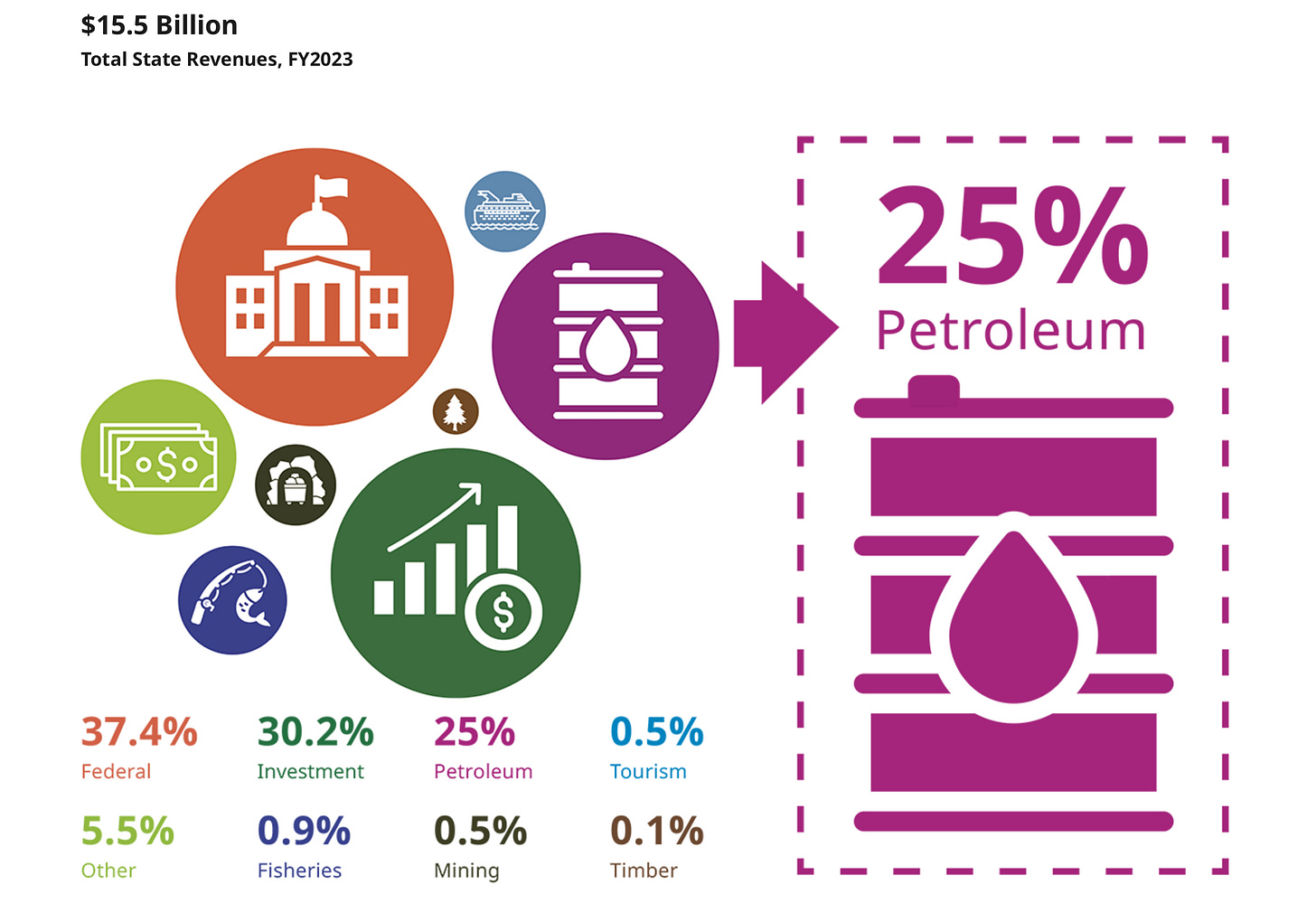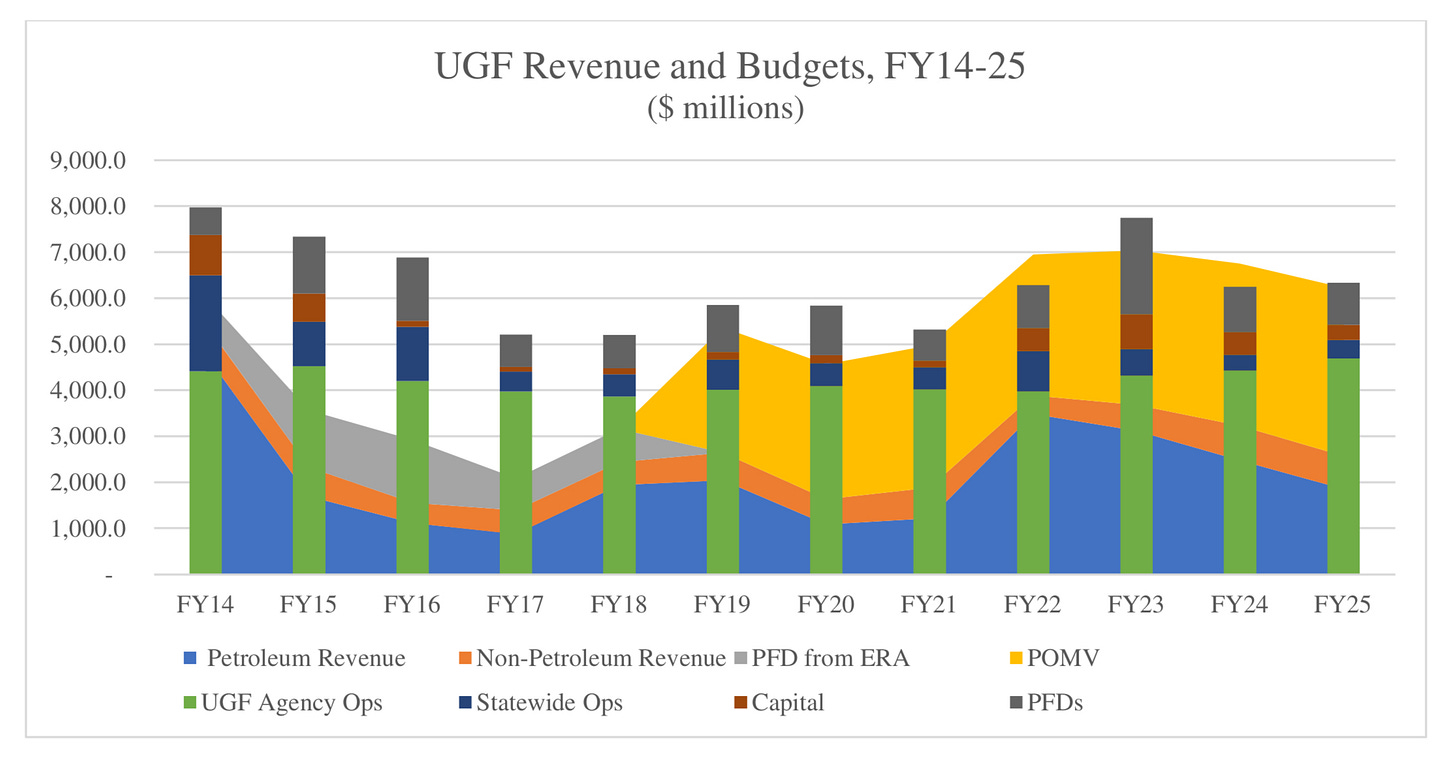Revenue bills, opposition to Medicaid cuts, and charter school authorizers
Senator Tobin breaks down the revenue generating proposals under consideration in Juneau. Plus, who should authorize charter schools in Alaska and why are lawmakers opposing federal cuts to Medicaid.
Dear Friends and Neighbors,
As the Alaska State Senate continues to consider legislation to generate new revenue, let me take a moment and unpack the handful of revenue proposals currently under review.
To recap, state revenue comes from a variety of sources.
The most significant revenue stream to the state of Alaska comes from the federal government. After that, it’s the earnings from the Permanent Fund (depicted as “Investment” in the graphic), oil and gas taxes, and then “other” becomes our next largest category. Fun fact: Listed under “Other” is the state marijuana tax, which produced more revenue for the state than mining and timber combined this past fiscal year.
Over the past decade, Alaska has slowly replaced its revenue from oil and gas production with earnings from the Permanent Fund. If Alaska continues on this path, it will only be a matter of time before the “Percent of Market Value” or POMV draw from the Permanent Fund is insufficient to provide even the most basic services for the state. Thus, to ensure the state continues to provide constitutionally obligated essential services, an unsustainable draw from the earnings of the Permanent Fund will be necessary. This will be bad.
To prevent overdrawing the Permanent Fund earnings, legislators are currently considering several pieces of legislation that will generate new revenue.
These bills include:
Highly Digitized Internet Tax (SB 113)
In the 1979s, the state of Alaska established a corporate tax structure for companies operating in Alaska. Fast-forward to today and the advancement of the Internet. While many online companies do business in Alaska, they do not have a physical presence in the state (think Netflix). SB 113 closes the corporate tax loophole for highly digitized companies, which 32 states have done, creating a fairer playing field for companies doing business in Alaska.
Corporate Tax Loophole Closure (SB 92)
Alaska has a graduated corporate income tax that ranges between 0.0% and 10%. With the passage of the federal 2017 Tax Cuts and Jobs Act, many companies have skirted the federal and state corporate tax structure by filing as S-Corporations (S-Corps). Instead of paying business income taxes, S-Corp income is divided among the shareholders. The result is that S-Corps pay no corporate tax in Alaska. At the same time, companies like ConocoPhillips pay the state’s corporate income tax. This is inherently unfair. I support SB 92 because it will close the S-Corp loophole and create a fairer corporate tax climate for Alaskan businesses.
Oil Tax Credit Reform (SB 112)
The Alaska Constitution directs the state to maximize the benefits of oil and gas development for Alaskan citizens. In 2013, the state passed SB 21, which radically changed Alaska's oil and gas tax structure. In our 2023 podcast interview, Bill Wielechowski provides a great synopsis of the harmful impacts of this revision and why reform is desperately needed.
Bracing for Cuts to Medicaid
As the U.S. House of Representatives continues to debate how to reduce federal spending by $880 billion, several proposals are being considered that would limit access to Medicaid. These proposals also require states to implement burdensome administrative oversight, which has previously been ineffective in addressing real issues related to waste, fraud, and abuse.
Earlier this week, the Alaska State Senate passed a resolution (Senate Joint Resolution 15) opposing these cuts. This resolution demonstrates a clear sense of unity in the face of potential adversity. It highlighted that over 40% of all Alaskans currently enrolled in Medicaid are under the age of 18. Furthermore, for those enrolled in a federally recognized tribe who receive services at an Indian Health Service facility, Medicaid covers 100% of their care costs.
As the situation in Washington, D.C., evolves rapidly, here are several valuable resources to help you stay informed. I often review these sources. Gathering news and information from trusted outlets—rather than relying solely on social media, opinion writers, or bloggers—is essential for obtaining factual information. This empowers you to make informed decisions and understand the implications of proposed changes.
Charter School Authorizers
In the past two years, the Executive Branch has pushed for a school choice initiative that would increase the number of groups allowed to approve public charter school contracts. This proposal would give state agencies, departments, the University of Alaska, and other groups the power to approve public charter schools in Alaska.
This change could force local towns to use their tax money to support schools not approved by their local school boards. This poses a serious risk to community schools and existing charter schools.
Supporters of this expanded authority often refer to a 2023 study from the Journal of School Choice, which ranked public charter schools in 32 states. During the 2024 legislative session, the study's main researcher, Paul Peterson, presented to both the House and Senate Education Committees. Mr. Peterson pointed out that the study only ranked charter schools and did not compare them to public schools. He also noted that the study had serious limitations, especially regarding the performance of Indigenous students. He concluded that the findings were observational, not causal.
Despite these issues, Mr. Peterson's study showed that Alaska's charter school system is the most successful compared to those in 32 other states. This lead to one of the most pertinent questions asked in both education policy committees, if Alaska has such a successful charter school system, why change it?
Moreover, Alaska's Constitution directs the legislature to support local control. Alaskans can vote for their local school board members, ensuring accountability. If the state expands who can approve local charter schools, it may limit the community's voice in choosing educational services. Unlike local school board members, Alaskans do not elect University of Alaska leaders or state agency commissioners. Allowing these groups to impose charter schools on local communities would undermine Alaskans' voices.





